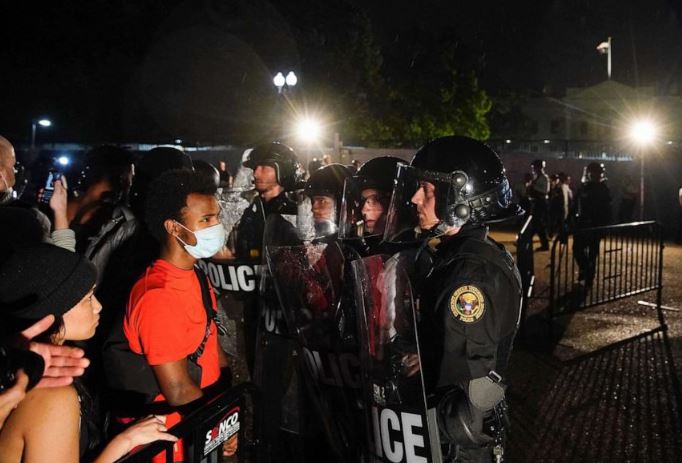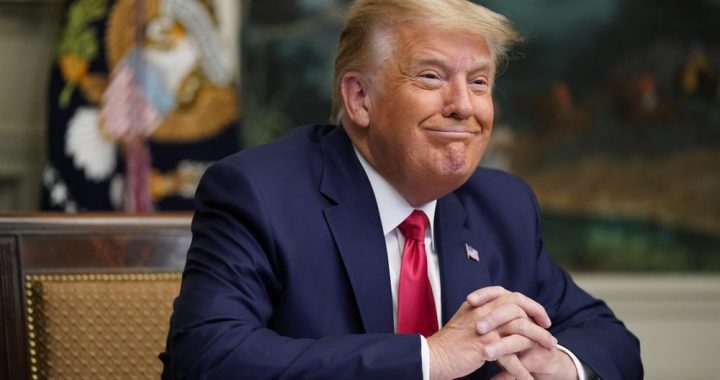
Trump again stokes racial divides, a reality at odds with his efforts to court black voters
President Donald Trump’s controversial comments suggesting looters in Minneapolis be shot and calling protesters “thugs” marks the latest example of the president choosing to stoke long standing racial divides rather than trying to comfort a hurting community, a reality at odds with his campaign’s effort to court black voters.
As the death of George Floyd sparked widespread condemnation after disturbing video spread across social media showing a police officer with his knee on Floyd’s neck as he yelled out, “I can’t breathe,” the president remained silent for days on the topic.
Trump instead tweeted repeatedly about topics in the news and pushed unfounded claims about mail-in ballots being tied to widespread fraud and continuously promoted a baseless murder conspiracy, despite a widower’s plea, to smear a cable news host.
The president first commented on Floyd’s death Wednesday afternoon after being asked by a reporter while touring Kennedy Space Center. He would go on to announced he’d asked the F.B.I. and Justice Department to investigate the incident.
But at nearly 1 a.m on Friday, as protests were raging around the country in the wake of another in-custody death of a black man, the president seemingly reverted to a place critics say he often heads; stoking heated tensions and fanning the flames of longstanding racial division.
In late-night tweets, which Twitter flagged for “glorifying violence,” the president smeared protesters as “thugs,” threatened to use military force to “assume control,” and said “when the looting starts, the shooting starts,” echoing a phrase first used by a Miami police chief that civil rights groups have widely condemned.
Trump and the White House have since tried to walk back the comments, claiming the president was not encouraging violence and that the president meant “looting leads to shooting,” saying he didn’t know the phrase’s origins.
The president’s campaign in a statement blamed the media, Twitter, and Democrats for “twisting of President Trump’s words… to take the entire nation down the worst road imaginable.”
“The facts show that the President expressed horror over the killing of George Floyd in Minneapolis and ordered the Department of Justice to get involved. When riots erupted in that city and elsewhere, he warned on Twitter that looting could quickly turn into violence,” Trump campaign manager Brad Parscale said in a statement.
But, senior Trump campaign advisor Katrina Pierson defended the president’s words on Twitter writing, “There’s no problem standing up to the looters and vandals,” in response to Massachusetts Sen. Elizabeth Warren criticizing Trump for suggesting looters should be shot.
Trump’s remarks were swiftly condemned by activists and critics claiming Trump’s words suggesting looters should be shot showed a stark difference between how the president responds to civil unrest depending on who’s protesting, pointing to Trump’s tweets from a few weeks back egging on mostly white and some armed conservative groups protesting lockdown measures amid the coronavirus in contrast to his remarks on majority black protesters in Minnesota.
Other common causes of cheapest cialis impotence issue include the consumption of medications that, often as a side effect of other conditions or diseases, including arthritis. Now that he’s had a sniff of the big stage, though, Irving is doing all he can to ensure his injuries are a thing of the past, even if it buy generic viagra means anonymity. All vardenafil pharmacy you would need to do for the other range of impotency solutions like Caverta, Silagra, Eriacta and many more to get relief from erectile dysfunction. Every medicine is supposed to be taken as per the prescribed dosage and recommended duration, the drug can be highly depressing, but with viagra online , you can get it online through a real clinic.“You’re quick to send your troops to kill us?” Leslie Redmond, the head of Minneapolis NAACP said at a press conference on Friday. “You were crying, ‘liberate Minnesota,’ when it came to economics, property, and money. When are you going to tell them to liberate black people in America?”
But following a night of civil unrest across the country, the president Saturday morning again threatened violent retaliation against protesters.
Hundreds of people gathered outside the White House Friday night to protest Floyd’s killing and the president’s response, and amid boiling conflict Trump took to Twitter and goaded the protesters writing that if the demonstration had escalated, “that’s when people would have been really badly hurt”—threatening to sick the “most vicious dogs” and turn the “most ominous weapons” against them, even seeming to revel in the idea that “many Secret Service agents just waiting for action.”
The president also, after threatening to use lethal force if protests escalated, appeared to urge pro-Trump demonstrators to show up to the White House on Saturday night, tweeting: “Tonight, I understand, is MAGA NIGHT AT THE WHITE HOUSE???” A move that many in response have pointed out could lead to escalated tensions.
Trump’s comments are the latest example of the president’s tendency to seemingly pour gasoline on flaming racial tensions. In 2017, after the massive white supremacist rally in Charlottesville, Virginia, the president said there is “blame on both sides,” leading to widespread condemnation that he was blustering racist groups.
And last summer, Trump told a group of four American congresswomen of color to “go back” to where they came from, a comment that ignited condemnation from Democrats and Republicans.
And as protests rage over Floyd’s killing, which many Americans decry as the latest example of police brutality against African Americans, the president’s history of urging law enforcement to use excessive force is facing renewed scrutiny. During a 2017 speech to law enforcement officers, the president urged against protecting the heads of suspected gang members when putting them in police cars. “Like when you guys put somebody in the car, and you’re protecting their head, you know, the way you put your hand over…I said, ‘You can take the hand away, O.K.?’”
Trump’s latest remarks amid tensions in Minneapolis over the death George Floyd come in an election year and while his campaign has heavily invested in an effort to appeal to black voters, with plans to open retail-style stores in black neighborhoods, a multi-million dollar Super Bowl ad buy, and the launch of a “Black Voices for Trump” coalition.
And as protests rage over Floyd’s killing, which many Americans decry as the latest example of police brutality against African Americans, the president’s history of urging law enforcement to use excessive force is facing renewed scrutiny. During a 2017 speech to law enforcement officers, the president urged against protecting the heads of suspected gang members when putting them in police cars. “Like when you guys put somebody in the car, and you’re protecting their head, you know, the way you put your hand over…I said, ‘You can take the hand away, O.K.?’”
Trump’s latest remarks amid tensions in Minneapolis over the death George Floyd come in an election year and while his campaign has heavily invested in an effort to appeal to black voters, with plans to open retail-style stores in black neighborhoods, a multi-million dollar Super Bowl ad buy, and the launch of a “Black Voices for Trump” coalition.







